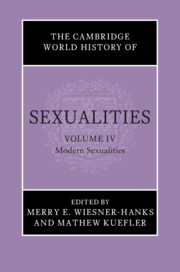Book contents
- The Cambridge World History of Sexualities
- The Cambridge World History of Sexualities
- The Cambridge World History of Sexualities
- Copyright page
- Contents
- Figures in Volume IV
- Contributors to Volume IV
- Editors’ Preface to the Series
- 1 Sexuality and Capitalism
- 2 Colonialism and Modern Sexuality
- 3 Gender, Migration, and Sexuality in the Modern World
- 4 ‘Pornography’, ‘Obscenity’, and the Suppression of Libertine Literature
- 5 Sexuality and the Print Media in the Modern World
- 6 Eugenics, Public Health, and Modern Sexuality
- 7 Sexuality and Consumerism in the Modern World: The Business of Pleasure
- 8 Sex Education in the Modern World
- 9 Birth Control and Reproductive Rights in the Modern World
- 10 The Impact of the World Wars on Modern Sexuality
- 11 Sexualities and Dictatorships of the Twentieth Century
- 12 Sexuality in Post-war Liberal Democracies
- 13 The Sexual Revolution
- 14 Sex Tourism: Fluid Borders of Meanings and Practices
- 15 The History of AIDS since 1981: Medicine, Politics, and Societies in a Pandemic
- 16 Sex Trafficking in the Modern World
- 17 Sex, Law, and Domestic Violence against Women in the Modern World
- 18 Sexuality under Attack Now
- Index
- Contents to Volumes I, II, and III
- References
18 - Sexuality under Attack Now
Published online by Cambridge University Press: 26 April 2024
- The Cambridge World History of Sexualities
- The Cambridge World History of Sexualities
- The Cambridge World History of Sexualities
- Copyright page
- Contents
- Figures in Volume IV
- Contributors to Volume IV
- Editors’ Preface to the Series
- 1 Sexuality and Capitalism
- 2 Colonialism and Modern Sexuality
- 3 Gender, Migration, and Sexuality in the Modern World
- 4 ‘Pornography’, ‘Obscenity’, and the Suppression of Libertine Literature
- 5 Sexuality and the Print Media in the Modern World
- 6 Eugenics, Public Health, and Modern Sexuality
- 7 Sexuality and Consumerism in the Modern World: The Business of Pleasure
- 8 Sex Education in the Modern World
- 9 Birth Control and Reproductive Rights in the Modern World
- 10 The Impact of the World Wars on Modern Sexuality
- 11 Sexualities and Dictatorships of the Twentieth Century
- 12 Sexuality in Post-war Liberal Democracies
- 13 The Sexual Revolution
- 14 Sex Tourism: Fluid Borders of Meanings and Practices
- 15 The History of AIDS since 1981: Medicine, Politics, and Societies in a Pandemic
- 16 Sex Trafficking in the Modern World
- 17 Sex, Law, and Domestic Violence against Women in the Modern World
- 18 Sexuality under Attack Now
- Index
- Contents to Volumes I, II, and III
- References
Summary
This chapter discusses why sexuality has become the site of a new “Cold War” and what are its new elements. Now, a fully-fledged illiberal program is offering an alternative to liberal cultural, social, and political politics. The new political actors fighting for redefining sexuality are capturing states using democratic or quasi-democratic methods to introduce new forms of governance as alternatives to liberal values. The chapter analyses the roots of and actors in these attacks. The example of Russia shows how the recent and ongoing war against Ukraine has changed previous assumptions and made alliances and allegiances very clear. The soft power of Putin”s Russia has been instrumental in the fight for “traditional values” as an inexpensive and effective political tool to undermine liberal values and the European Union. This matters not only because Russia has created an alternative, illiberal political order to liberal human rights over the past decade, but also because it has become an international actor, financing local and international NGOs to disrupt and undermine liberal states” values and activities around the world. The chapter closes with discussing how the appropriation of liberal values combined with emptying their meanings to legitimize a new war of Russia shows that we are really facing a turning point in our history.
Keywords
- Type
- Chapter
- Information
- The Cambridge World History of Sexualities , pp. 381 - 398Publisher: Cambridge University PressPrint publication year: 2024

